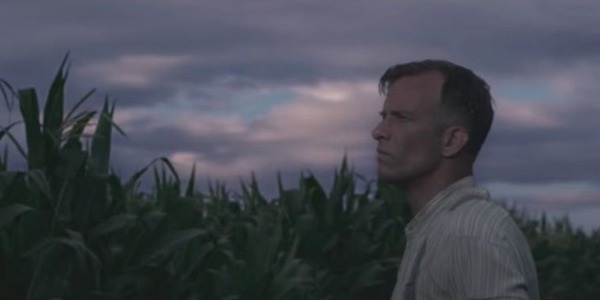1922 begins with an older Thomas Jane sitting down to write out his story in a hotel room. The subject? His confession.
Based on Stephen King’s novella of the same name featured in Full Dark No Stars, this tale doesn’t rely on the concept of monsters, or any supernatural twist. 1922 focuses on the darkest corners of a man, and the subsequent horrors that they are capable of. To quote the film, and Thomas Jane’s Wilfred James “I believe that there is another man inside every man, a stranger, a conniving man.”
This one killed his wife. He lets the viewers know right away, and the deed is completed within the first twenty five minutes of the movie.1922 isn’t about the before, it’s about the after.
Justifying A Sin
In 1922, Wilfred James (Thomas Jane), his wife Arlette (Molly Parker) and son Henry (Dylan Schmid) live on a corn farm in Hemingford Home, Nebraska. Fans of King might recognize the town as a pinnacle locale in Stephen King’s The Stand.
His restless wife wants a fresh start and has inherited enough land to sell and make a significant profit. He’s content in his role, it’s what he knows, and he hopes to pass the farm on to his son someday. She, however, is not easily swayed.
The answer? Murder.

Wilfred carefully considers the specifics needed to pull it off. “Murder is work,” as he says. First, he needs to convince his son to help. Henry has a relationship with the neighbor’s (Neal McDonough) daughter Shannon (Kaitlyn Bernard). If the family was to sell and the two divorced, he’d been forced to move away with his mother.
The conniving man knows this is just what he needs.
As father and son their bond is strong, at least in the beginning, but as the movie progresses and their lives unfurl, it’s strained to say the least. Each battle their own emotions and eventually drift apart, but Henry feels the pressure first and the two young lovers are inevitably affected too.
Wilfred and Henry have their stories straight, and when the local sheriff (Brian d’Arcy James) investigates, they keep to their fallacies well. There are businessmen leaning, ones who sought to purchase the land, but their biggest threat is themselves.
Suffering The Consequences
As we watch the years wear and the guilt eat at Wilfred, his mind starts to break. 1922 captures the weight of morality and the presence the dead leave behind. There is an unreliability when it comes to his telling, but the one certainty is that it never abandoned him. The film perpetuates a similar, heavy effect.
Written and directed by Zak Hilditch, the hour and forty-two minute adaptation isn’t watered down. Depicted with a subtly that allows the suspense to build organically, 1922 commits to its psychological torment with precision.
It is filmed wonderfully, with cinematographer Ben Richardson using nature to portray both the beauty and gloom of the land, changing as the mood shifts. The music strums along, hitting every pressure point along the way.
Thomas Jane gives his best performance in a while, and at times is barely recognizable with his thick accent and clenched scowl. He manages to convince us of his menace, and yet imbue us with sympathy.
About three quarters of the way through there is a bit of a lull, and there’s a Bonnie and Clyde like subplot with Henry and Shannon that doesn’t quite mesh. Within the context of the film, it feels a little out of place.
Conclusion: 1922
In the beginning, Wilfred is full of justifications, and as a seasoned man he regretfully reflects. The majority of 1922 gives us this transition, and its emphasis and the source of its horror relies on one question: Is every one capable of such a thing?
Throughout the movie Jane is haunted by visions of his family and – after seeing them feasting on his dead wife’s body – rats. These especially follow him until the last moments of the film.
King’s usual talent can be felt guiding Wilfred to the edge of his sanity. It’s a mostly faithful transition to screen but as a fan of the novella, I felt the ending here didn’t quite bite the same way. Overall, it’s a satisfying climax. Like Netflix’s recent Gerald’s Game, this adds to a year of terrific adaptations of the author’s work.
The slow building dread makes 1922 a movie experience that does its due diligence to fester, just like the body that resides at the center of Wilfred’s shame.
What did you think? How did it rank among King’s other adaptations? Tell us your thoughts in the comments below!
1922 is now available to stream on Netflix.
Does content like this matter to you?
Become a Member and support film journalism. Unlock access to all of Film Inquiry`s great articles. Join a community of like-minded readers who are passionate about cinema - get access to our private members Network, give back to independent filmmakers, and more.